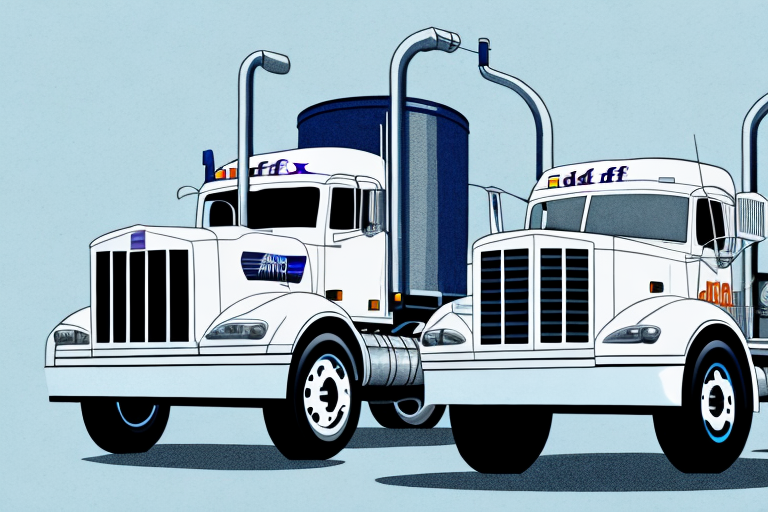Understanding the Impact of Fuel Surcharge on Shipping Costs
Shipping is a vital component of the global economy, connecting businesses across countries and continents. However, the cost of shipping can be complex and subject to various factors, including fuel prices. Fuel surcharges have become an essential part of shipping costs, affecting businesses’ bottom lines. As such, it’s crucial to understand fuel surcharges and their impact on shipping costs.
What is a fuel surcharge and how is it calculated?
A fuel surcharge is an additional fee added to shipping costs to account for the cost of fuel. It’s calculated by a percentage of the total shipping cost, with the percentage varying from company to company. The surcharge is typically based on the average cost of fuel over a specific period, usually a month.
It’s important to note that fuel surcharges can fluctuate based on the price of fuel. If the cost of fuel increases, the surcharge may also increase to cover the additional expense. Some companies may also adjust their fuel surcharge on a weekly or even daily basis to reflect changes in fuel prices. It’s important to check with your shipping provider to understand how their fuel surcharge is calculated and how it may impact your shipping costs.
The role of fuel prices in determining a shipping company’s costs
Fuel costs play a significant role in determining a shipping company’s overall costs. As fuel prices rise and fall, so do the companies’ expenses. Due to the volatile nature of fuel prices, some shipping companies introduce fuel surcharges to account for the fluctuation in fuel costs.
Furthermore, the type of fuel used by a shipping company can also impact their costs. While some companies may opt for cheaper, lower quality fuels, these fuels may result in higher maintenance costs and lower fuel efficiency. On the other hand, higher quality fuels may come at a higher cost, but can lead to better fuel efficiency and lower maintenance costs in the long run.
The history of fuel surcharges in the shipping industry
Fuel surcharges were introduced in the 1970s oil crisis, when oil prices increased dramatically. Shipping companies introduced fuel surcharges to help mitigate the rising fuel costs. The surcharges have since become a common practice in the shipping industry.
However, fuel surcharges have been a controversial topic in recent years. Some customers argue that the surcharges are excessive and not transparent enough, while shipping companies argue that they are necessary to cover the fluctuating fuel costs. In response to the criticism, some companies have started to include more detailed information about fuel surcharges in their contracts and invoices, in order to increase transparency and avoid disputes.
How are fuel surcharges affected by global events and market fluctuations?
Fuel surcharges are affected by global events and market fluctuations. As fuel prices are directly tied to the global oil market, any significant changes in oil prices and supply can affect fuel surcharges. For instance, geopolitical tensions in oil-producing countries, natural disasters, and pandemics like COVID-19 can cause fuel price fluctuations. Shipping companies must stay on top of global events as they adjust their fuel surcharges to meet the changing fuel prices and costs.
Another factor that can affect fuel surcharges is the type of fuel used by shipping companies. Some companies may use alternative fuels, such as liquefied natural gas (LNG) or biofuels, which can have different price fluctuations compared to traditional fossil fuels. Additionally, government regulations and policies on fuel usage and emissions can also impact fuel surcharges.
It is important for shipping companies to communicate any changes in fuel surcharges to their customers in a timely and transparent manner. This allows customers to plan and budget accordingly for shipping costs. Some companies may also offer fuel surcharge caps or discounts to provide more stability and predictability in pricing for their customers.
Different types of fuel surcharges and their impact on shipping rates
There are different types of fuel surcharges, such as the bunker adjustment factor (BAF), which is based on the cost of bunkers (fuel for ships). Other types of fuel surcharges include the fluctuation surcharge, emergency or contingency surcharge, and slow-steaming surcharge. Depending on the type of fuel surcharge, different factors can impact shipping rates, including the size and nature of the cargo being shipped and the distance of the shipment.
The bunker adjustment factor (BAF) is the most common type of fuel surcharge used in the shipping industry. It is calculated based on the price of fuel and is adjusted periodically to reflect changes in fuel prices. The fluctuation surcharge, on the other hand, is used to account for sudden and unexpected changes in fuel prices. This type of surcharge is usually applied when there is a significant increase in fuel prices that cannot be absorbed by the shipping company.
The emergency or contingency surcharge is applied when there is a sudden disruption in the supply of fuel, such as during a natural disaster or political unrest. This surcharge is used to cover the additional costs incurred by the shipping company to ensure that the cargo is delivered on time. The slow-steaming surcharge is applied when ships are required to slow down to reduce fuel consumption and emissions. This surcharge is used to compensate for the longer transit times and additional costs associated with slow-steaming.
It is important for shippers to understand the different types of fuel surcharges and their impact on shipping rates. By doing so, they can better manage their shipping costs and negotiate more favorable rates with their carriers.
How do shipping companies pass on fuel surcharge costs to customers?
Shipping companies usually pass on fuel surcharge costs to customers by adding the surcharge as an additional line item on the invoice. The surcharge is often calculated as a percentage of the shipment’s total cost. However, shipping companies can also include the fuel surcharge in the base freight rate, making it a fixed part of the shipping cost.
In addition, some shipping companies may adjust their fuel surcharge rates on a regular basis to reflect changes in fuel prices. This means that customers may see fluctuations in the amount of the fuel surcharge from one shipment to the next, depending on the current market conditions. It is important for customers to stay informed about these changes and to factor them into their overall shipping costs.
The impact of fuel-efficient ships on fuel surcharges and shipping costs
Fuel-efficient ships can significantly impact fuel surcharges and shipping costs. The use of fuel-efficient ships can lower fuel consumption, resulting in reduced fuel surcharges. However, the use of fuel-efficient ships can be expensive upfront, which may lead to a higher base freight rate to cover the cost of the vessels. Despite this, fuel-efficient ships can still provide cost savings in the long run.
In addition to cost savings, fuel-efficient ships also have a positive impact on the environment. These ships emit less greenhouse gases and pollutants, which can help to reduce the carbon footprint of the shipping industry. As a result, many companies are investing in fuel-efficient ships as part of their sustainability initiatives. In the long term, this investment can also help to improve the reputation of the shipping industry and attract environmentally conscious customers.
Strategies for managing fuel surcharge costs for businesses
Businesses can manage fuel surcharge costs by negotiating favorable fuel surcharge terms in their shipping contracts. They can also monitor fuel cost trends and adjust their shipping schedules accordingly. Businesses can also utilize shipping optimization software to help them identify the most cost-efficient shipping routes and methods.
Another strategy for managing fuel surcharge costs is to invest in fuel-efficient vehicles or equipment. This can help reduce the amount of fuel needed for transportation, ultimately lowering fuel surcharge costs. Additionally, businesses can consider alternative modes of transportation, such as rail or sea, which may have lower fuel surcharges compared to road transportation.
Comparing fuel surcharge policies across different shipping companies
It’s essential for businesses to compare fuel surcharge policies across different shipping companies to find the best rates and terms. A careful analysis of each company’s fuel surcharge policies can help businesses understand how each company charges for fuel surcharges and make informed decisions on which company to work with.
One important factor to consider when comparing fuel surcharge policies is how frequently the surcharges are updated. Some companies update their fuel surcharges on a weekly or even daily basis, while others may only update them monthly or quarterly. This can have a significant impact on the overall cost of shipping, especially for businesses that ship large volumes of goods.
Another factor to consider is whether the shipping company offers any discounts or incentives for customers who use less fuel. Some companies may offer lower fuel surcharges for customers who use more fuel-efficient shipping methods or who consolidate their shipments to reduce the number of trips required. These types of incentives can help businesses save money on shipping costs over time.
Future trends in fuel surcharges and their implications for the shipping industry
The future of fuel surcharges in the shipping industry is unclear as it’s subject to various factors such as fuel prices and technological advancements. However, it’s expected that shipping companies will continue to use fuel surcharges as a way to mitigate rising fuel costs. The growing demand for sustainable shipping practices can also lead to new types of fuel surcharges aimed at promoting eco-friendliness in the shipping industry.
Best practices for negotiating shipping contracts with favorable fuel surcharge terms
When negotiating shipping contracts, businesses should try to negotiate favorable fuel surcharge terms, such as caps on fuel surcharges. It’s also essential to ensure that the contract protects the business from sudden or unreasonable changes in the fuel surcharge terms.
The impact of COVID-19 on fuel surcharges and the global shipping industry
The COVID-19 pandemic has significantly impacted fuel surcharges and the global shipping industry. The pandemic has caused a decrease in demand for shipping services, leading to a decrease in fuel surcharges. However, the global shipping industry has also been affected by the pandemic’s disruption to global supply chains and economies, resulting in increased costs and fuel surcharges for some businesses.
The role of government regulations in shaping the use of fuel surcharges in the shipping industry
Government regulations shape the use of fuel surcharges in the shipping industry. Regulations such as the International Maritime Organization’s (IMO) Emissions Control Area (ECA) regulations aim to promote environmentally friendly shipping practices, and as such, may directly impact fuel surcharges. Shipping companies must adhere to these regulations and adjust their fuel surcharges accordingly.
Case studies on how businesses have successfully managed their shipping costs amidst changing fuel prices and surcharges
Several businesses have successfully managed their shipping costs amidst changing fuel prices and surcharges. For instance, some businesses have implemented fuel-efficient shipping practices, while others have negotiated favorable fuel surcharge terms in their shipping contracts. These businesses can serve as examples for other businesses looking for ways to manage their shipping costs.
Overall, fuel surcharges play an essential role in the shipping industry, impacting shipping costs and businesses’ bottom lines. It’s crucial for businesses to understand the factors that affect fuel surcharges and implement strategies to manage their shipping costs effectively.



















